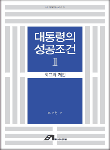
The Presidency in Korea, Vol 2
Books | 2002-12-20
Compiled by Su-Hyun Lee
This is the product of several seminars with the former and the incumbent prime ministries, cabinet members and presidential secretaries during the initial phase of the research on redefining presidential roles and restructuring presidential power.
This is the product of several seminars with the former and the incumbent prime ministries, cabinet members and presidential secretaries during the initial phase of the research on redefining presidential roles and restructuring presidential power. Vigorous and lively discussions among scholars and politicians help to critical agendas, basic directions and specific methods of reform aimed toward more democratic and effetive presidential leadership. This book contains a comprehensive set of policy recommendations for the reform of the presidency and its Blue House Secretariat.
 Contents
Contents
Part One: President and the Presidential Project
Chapter 1. Evaluating the Current Presidential System
The Presidential System and the Deterioration of Governance | Hong-Goo Lee
The Imperial Presidency: A Constitutional Perspective | Chul-Un Park
The Authority of Bureaucracy, the National Assembly, and the Presidency | Kyung-Won Kim
The Dilemmas of Governance in the Era of Democratization | Jong-Chan Lee
Chapter 2. The Presidency and Authority
The Authority and Responsibility of the Prime Minister | Jae-Bong Rho
Authority and the Imperial Presidency: the National Assembly, the Prosecution, and the Board of Audit and Inspection | Kyung-Sik Kang
Change in Governance: The Intelligence Bureau's Change of Status | Young-Soo Kim
In Search of a Proper Position for the Intelligence Bureau | Jong-Chan Lee
Part Two: A New Governing System and Systemic Reform
Chapter 3. Guidelines for Restructuring the Governing System
Changing the National Agenda: the Re-establishment of National Strategies | Bong-Kyun Kang
Characteristics and Limitations of Governmental Organizations | Choong-Nam Kim
Chapter 4. Structural Reform Through Decentralization
Political Reforms and Administrative Reforms | Chul-Un Park
Presidential Reform Through Ministerial Accountability | Hong-Goo Lee
Proposals to Enhance the Power of the Prime Minister | Bong-Kyun Kang
Part Three: The Presidential Secretariat
Chapter 5. Historical Trajectories of the Presidential Secretariat
Presidential Secretariat under the President Park Jung Hee: The Early Years | Jung-Ryum Kim
The Role of the Chief Presidential Secretariat During the Fifth Republic | Kyung-Won Kim
The Presidential Secretariat in the Era of Democratization | Young-Soo Kim
Chapter 6. The Role and Organization of the Presidential Secretariat
Missions of the Presidential Secretariat During the Era of Decentralization | Gong-Il Sa
The Presidential Secretariat and the Establishment of National Strategies | Young-Soo Kim
The Presidential Secretariat and Administrative Reform | Kyung-Sik Kang
Teamwork and the Revitalization of the Presidential Project | Choong-Nam Kim
Chapter 7. The Presidential Secretariat and Its Capacity for Policy Planning
-The Presidential Transition Committee
An Evaluation of the 15th Presidential Transition Committee | Jong-Chan Lee
The Process of Transition and Policy Coordination | Young- Soo Kim
-Policy Planning
The Presidential Project and the Politics of Reform | Se-Il Park
International Relations and The Establishment of A National Strategy | Kyung-Won Kim
Planning for national strategy and the system of the presidential secretariat | Chul-Un Park
Reinforcing the presidential secretariat and policy planning | Young- Soo Kim
Chapter 8. Conflict and Mediation: The Problem Solving Function of the Presidential Secretariat
The Role of the Senior Secretary | Gong-Il Sa
The Presidential Secretariat and Its Mediating Function | Bong-Kyun Kang
Formalization of the Policy Mediating Process | Choong-Nam Kim
Chapter 9. The Presidential Secretariat's Management of Personnel
Reconsidering Personnel Management: the Utility of Think Tanks | Gong-Il Sa
Improving the Hiring of Officials | Bong-Kyun Kang
Preserving Documentation and Evaluating Personnel | Young-Soo Kim
Reassessing Government Employment Practices | Kyung-Sik Kang
Establishing Guidelines for Personnel Management | Chul-Un Park
Invigorating Teamwork Through modifying Personnel Management | Choong-Nam Kim
Transparency in the System of Personnel Management | Se-Il Park
 Contributors
Contributors
Speakers
Hong-Goo Lee, the former Prime Minister
Chul-Un Park, the former Minister without Portfolio
Kyung-Won Kim, the former Korean Ambassador to America
Jong-Chan Lee, the former Minister of National Intelligence Service
Jae-Bong Rho, the former Prime Minister
Kyung-Sik Kang, the former Deputy Prime Minister
Young-Soo Kim, the former Minister of Ministry of Culture & Tourism
Bong-Kyun Kang, the former Minister of Ministry of Finance and Economy
Choong-Nam Kim, the former Secretary without Portfolio
Jung-Ryum Kim, the former Presidential Secretariat
Gong-Il Sa, the former Minister of Ministry of Finance and Economy
Se-Il Park, the former Presidential Secretariat
Editor
Su-Hyun Lee, EAI researcher
Books
Changing Korean Voters 6: The 19th South Korea’s Presidential Election through Candle Light Protest and Impeachment
Won-Taek Kang | 2002-12-20
Books
U.S.-China Competition in the Architecture of a Regional Order in the Asia-Pacific
Young-Sun Ha | 2002-12-20